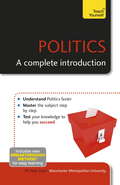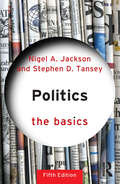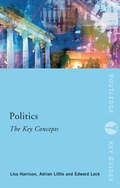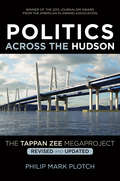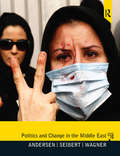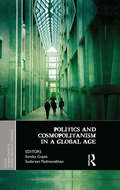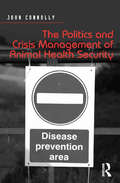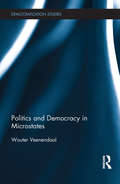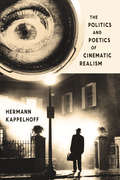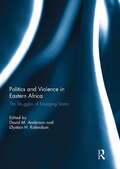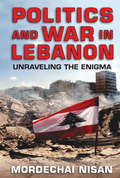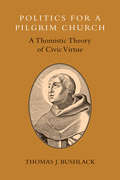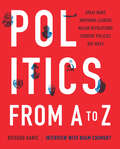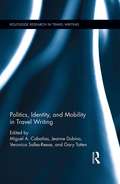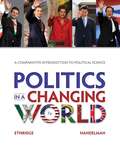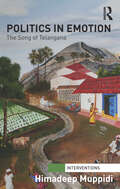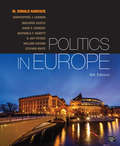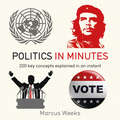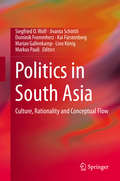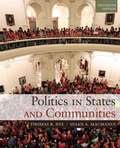- Table View
- List View
Politics: Teach Yourself
by Peter JoyceWritten by Dr Peter Joyce, who is Principal Lecturer at Manchester Metropolitan University, Politics: A Complete Introduction is designed to give you everything you need to succeed, all in one place. It covers the key areas that students are expected to be confident in, outlining the basics in clear jargon-free English, and then providing added-value features like summaries of key books, and even lists of questions you might be asked in your seminar or exam. The book uses a structure that mirrors the way Politics is taught on many university courses. Chapters include key issues in studying politics, liberal democracy, political ideologies, elections and electoral systems, parties, pressure groups, the media, constitutions, the executive branch of government, bureaucracy, the legislative branch, the judiciary and law enforcement, sub-national government, and supra-national government and the role of the nation state in the modern world.
Politics: The Basics. Basics (The Basics)
by Nigel Jackson Stephen D TanseyNow in its fifth edition, Politics: The Basics explores the systems, movements and issues at the cutting edge of modern politics. A highly successful introduction to the world of politics, it offers clear and concise coverage of a range of issues and addresses fundamental questions such as: • Why does politics matter? • Why obey the state? • What are the key approaches to power? • How are political decisions made? • What are the current issues affecting governments worldwide? Accessible in style and topical in content, the fifth edition has been fully restructured to reflect core issues, systems and movements that are at the centre of modern politics and international relations. Assuming no prior knowledge in politics, it is ideal reading for anyone approaching the study of politics for the first time.
Politics: The Key Concepts (Routledge Key Guides)
by Lisa Harrison Adrian Little Ed LockPolitics: The Key Concepts is an up-to-date and broad-ranging introduction to the terms that lie at the heart of political discourse. Entries are drawn from areas such as political theory, international politics, political science and methodology. As well as explaining core, established principles, this informative guide explores some of the more complex, topical and contested concepts from the world of politics. Concepts covered include: Capitalism Class Identity Institutionalism Referendum Marxism Pluralism Postmodernism Socialism Social Constructivism In an accessible A-Z format with helpful cross-referencing and suggestions for further reading, Politics: The Key Concepts is an invaluable reference for all students of politics, international relations and related courses.
Politics Across the Hudson: The Tappan Zee Megaproject (Rivergate Regionals Collection)
by Philip Mark PlotchWinner of the 2015 American Planning Association New York Metro Chapter Journalism Award The State of New York is now building one of the world’s longest, widest, and most expensive bridges—the new Tappan Zee Bridge—stretching more than three miles across the Hudson River, approximately thirteen miles north of New York City. In Politics Across the Hudson, urban planner Philip Plotch offers a behind-the-scenes look at three decades of contentious planning and politics centered around this bridge, recently renamed for Governor Mario M. Cuomo, the state's governor from 1983 to 1994. He reveals valuable lessons for those trying to tackle complex public policies while also confirming our worst fears about government dysfunction. Drawing on his extensive experience planning megaprojects, interviews with more than a hundred key figures—including governors, agency heads, engineers, civic advocates, and business leaders—and extraordinary access to internal government records, Plotch tells a compelling story of high-stakes battles between powerful players in the public, private, and civic sectors. He reveals how state officials abandoned viable options, squandered hundreds of millions of dollars, forfeited more than three billion dollars in federal funds, and missed out on important opportunities. Faced with the public’s unrealistic expectations, no one could identify a practical solution to a vexing problem, a dilemma that led three governors to study various alternatives rather than disappoint key constituencies. This revised and updated edition includes a new epilogue and more photographs, and continues where Robert Caro’s The Power Broker left off and illuminates the power struggles involved in building New York’s first major new bridge since the Robert Moses era. Plotch describes how one governor, Andrew Cuomo, shrewdly overcame the seemingly insurmountable obstacles of onerous environmental regulations, vehement community opposition, insufficient funding, interagency battles, and overly optimistic expectations...
Politics and Change in the Middle East: New International Edition
by Roy R. Anderson Robert Seibert Jon G WagnerA longtime bestseller, Politics and Change in the Middle East employs a multidisciplinary approach to comprehensively and evenhandedly study the region’s past, present, and future. Through politics, economics, culture, and history, this text offers a rugged analytical framework that familiarizes students with the Middle East and helps them to critically evaluate contemporary developments. Thematically organized, Politics and Change in the Middle East introduces students to the primary actors and issues that define the region and its role in world politics.
Politics and Cosmopolitanism in a Global Age (Ethics, Human Rights and Global Political Thought)
by Sonika Gupta Sudarsan PadmanabhanThis book offers a unique reconceptualization of cosmopolitanism. It examines several themes that inform politics in a globalized era, including global governance, international law, citizenship, constitutionalism, community, domesticity, territory, sovereignty, and nationalism. The volume explores the specific philosophical and institutional challenges in constructing a cosmopolitan political community beyond the nation state. It reorients and decolonizes the boundaries of ‘cosmopolitanism’ and questions the contemporary discourse to posit inclusive alternatives. Presenting rich and diverse perspectives from across the world, the volume will interest scholars and students of politics and international relations, political theory, public policy, ethics, and philosophy.
The Politics and Crisis Management of Animal Health Security
by John ConnollyThe Politics and Crisis Management of Animal Health Security addresses the 2001 foot and mouth epidemic in the United Kingdom - one of, if not the, most significant crises ever to face the UK farming industry. Underpinned by interviews with politicians and bureaucrats and with significant primary documentary analysis the book shows that the crisis was a critical juncture in how disease outbreaks have been planned and managed ever since. The author explores how this event affected policy and governance arrangements for managing subsequent disease-induced threats (such as avian influenza and bovine TB) and concludes by considering the ’temporality’ of lesson learning by the UK government including the current and future challenges associated with managing incongruent risks (e.g., flood protection, swine flu and Ebola). This book provides students of public policy and administration with a significant illustration of how key concepts and analytical lenses from public policy can be applied to the study of the contours of practical policy change.
Politics and Democracy in Microstates (Democratization and Autocratization Studies)
by Wouter VeenendaalWhy are small states statistically more likely to have a democratic political system? By addressing this question from a qualitative and comparative methodological angle, this book analyses the effects of a small population size on political competition and participation. By comparing the four microstates of San Marino (Europe), St. Kitts and Nevis (Caribbean), Seychelles (Africa), and Palau (Oceania), it provides fresh and stimulating insight, concluding that the political dynamics of microstates are not as democratic as commonly believed. Instead, it is found in all four cases that smallness results in personalistic politics, dominance of the political executive, patron-client relations between citizens and politicians, and the circumvention of formal political institutions. In addition, the book suggests that the study of formal institutions provides an incomplete image of microstate democracy and that informal characteristics of politics in microstates also need to be explored in order to better explain the influence of smallness on democracy. This book will be of key interest to scholars and students of democracy, democratization, regional and decentralization studies and comparative politics.
The Politics and Poetics of Cinematic Realism (Columbia Themes in Philosophy, Social Criticism, and the Arts)
by Hermann KappelhoffHermann Kappelhoff casts the evolution of cinema as an ongoing struggle to relate audiences to their historical moment. Appreciating cinema's unique ability to bind concrete living conditions to individual experience (which existing political institutions cannot), he reads films by Sergei Eisenstein and Pedro Almodóvar, by the New Objectivity and the New Hollywood, to demonstrate how cinema situates spectators within society. Kappelhoff applies the Deleuzean practice of "thinking in images" to his analysis of films and incorporates the approaches of Jacques Rancière and Richard Rorty, who see politics in the permanent reconfiguration of poetic forms. This enables him to conceptualize film as a medium that continually renews the audiovisual spaces and temporalities through which audiences confront reality. Revitalizing the reading of films by Visconti, Fassbinder, Kubrick, Friedkin, and others, Kappelhoff affirms cinema's historical significance while discovering its engagement with politics as a realm of experience.
Politics and the Sacred
by Harald WydraThis path-breaking book argues that practices of the sacred are constitutive of modern secular politics. Following a tradition of enquiry in anthropology and political theory, it examines how limit situations shape the political imagination and collective identity. As an experiential and cultural fact, the sacred emerges within, and simultaneously transcends, transgressive dynamics such as revolutions, wars or globalisation. Rather than conceive the sacred as a religious doctrine or a metaphysical belief, Wydra examines its adaptive functions as origins, truths and order which are historically contingent across time and transformative of political aspirations. He suggests that the brokenness of political reality is a permanent condition of humanity, which will continue to produce quests for the sacred, and transcendental political frames. Working in the spirit of the genealogical mode of enquiry, this book examines the secular sources of political theologies, the democratic sacred, the communist imagination, European political identity, the sources of human rights and the relationship of victimhood to new wars.
Politics and Violence in Eastern Africa: The Struggles of Emerging States
by David M. Anderson and Øystein H. RolandsenOver the fifty years between 1940 and 1990, the countries of eastern Africa were embroiled in a range of debilitating and destructive conflicts, starting with the wars of independence, but then incorporating rebellion, secession and local insurrection as the Cold War replaced colonialism. The articles gathered here illustrate how significant, widespread, and dramatic this violence was. In these years, violence was used as a principal instrument in the creation and consolidation of the authority of the state; and it was also regularly and readily utilised by those who wished to challenge state authority through insurrection and secession. Why was it that eastern Africa should have experienced such extensive and intensive violence in the fifty years before 1990? Was this resort to violence a consequence of imperial rule, the legacy of oppressive colonial domination under a coercive and non-representative state system? Did essential contingencies such as the Cold War provoke and promote the use of violence? Or, was it a choice made by Africans themselves and their leaders, a product of their own agency? This book focuses on these turbulent decades, exploring the principal conflicts in six key countries – Kenya, Uganda, Sudan, Ethiopia, Somalia and Tanzania. This book was published as a special issue of the Journal of Eastern African Studies.
Politics and War in Lebanon: Unraveling the Enigma
by Mordechai NisanLebanon is an exceptionally misunderstood country; its religious politics are typically misrepresented and denigrated in Western political commentary. Politics and War in Lebanon offers a lucid examination of Lebanese society and politics. Mordechai Nisan examines Lebanon in its own termson its own cultural turf. He then points to the causes of political disintegration in 1975 and explores the capacity of Lebanon to recover and retain its unique national poise.Avoiding disorienting Western stereotypes, Nisan presents Lebanon in its own native frame of reference, as a multi-ethnic country that operates according to its immutable and enigmatic political forms. Lebanon is different from other Arab countries, as demonstrated through its very complex electoral system, its tradition of cross-elite cooperation, and its special sense of Lebanese national identity that differentiates it from its overbearing Syrian neighbor.Nisan explores intra-Maronite Christian feuds, identifies Syria's occupation strategy, analyzes the violence of the Palestinians, and studies Israel's failed policy strategy and the role of Hezbollah in the Lebanese power equation. Lebanon is caught between its special historical identity as a country ofpoise, creativity, and liberty and the interminable warfare in the streets and villages of the country. Although its future appears dim, its resilience enabled it to prevail in the past, and may yet continue to do so.
Politics: A Complete Introduction: Teach Yourself
by Peter JoyceThis is your go-to guide to politicsAs the UK gears up for a snap general election on the back of a hotly contested and divisive referendum, there has never been a better time to discover more about politics and how it works. Politics: A Complete Introduction explains everything you need to know, giving you a comprehensive and easy-to-understand introduction to a complex subject. Inside you will learn about different political ideologies and systems, referendums, elections and electoral systems, political parties and party systems, protest, the media and politics, constitutions and human rights, what the courts do, and how the machinery of government is organised. It also covers the nation state in the modern world and international terrorism. Politics: A Complete Introduction is a jargon-free guide that will get you informed, fast.
Politics for a Pilgrim Church: A Thomistic Theory of Civic Virtue
by Thomas J. BushlackPresents an innovative, constructive alternative to Christian involvement in the "culture wars" Church leaders and scholars have long wrestled with what should provide a guiding vision for Christian engagement in culture and politics. In this book Thomas Bushlack argues that a retrieval of Thomas Aquinas's understanding of civic virtue provides important resources for guiding this engagement today. Bushlack suggests that Aquinas's vision of the pilgrim church provides a fitting model for seeking the earthly common good of the political community, and he notes the features of a Thomistic account of justice and civic virtue that remain particularly salient for the twenty-first century. The book concludes with suggestions for cultivating a Christian rhetoric of the common good as an alternative to the predominant forms of discourse fostered within the culture wars that have been so divisive.
Politics for a Pilgrim Church: A Thomistic Theory of Civic Virtue
by Thomas J. BushlackPresents an innovative, constructive alternative to Christian involvement in the "culture wars" Church leaders and scholars have long wrestled with what should provide a guiding vision for Christian engagement in culture and politics. In this book Thomas Bushlack argues that a retrieval of Thomas Aquinas's understanding of civic virtue provides important resources for guiding this engagement today. Bushlack suggests that Aquinas's vision of the pilgrim church provides a fitting model for seeking the earthly common good of the political community, and he notes the features of a Thomistic account of justice and civic virtue that remain particularly salient for the twenty-first century. The book concludes with suggestions for cultivating a Christian rhetoric of the common good as an alternative to the predominant forms of discourse fostered within the culture wars that have been so divisive.
Politics from A to Z
by Richard GanisDeepen your understanding of how politics work, and why they matter, with this timely guide. Politics from A to Z provides an up-to-date, thoroughly researched glossary of political topics spanning ancient Greece to contemporary America. Featuring an introductory interview with Noam Chomsky, Politics from A to Z is ideal for anyone interested in politics, from beginners to scholars. With detailed entries, visual references, and useful timelines, Politics from A to Z introduces the influential figures and ideas that have shaped politics, from the American Revolution to Zionism.
Politics, Identity, and Mobility in Travel Writing (Routledge Research in Travel Writing)
by Jeanne Dubino Miguel A. Cabañas Veronica Salles-Reese Gary TottenThis collection examines the intersections between the personal and the political in travel writing, and the dialectic between mobility and stasis, through an analysis of specific cases across geographical and historical boundaries. The authors explore the various ways in which travel texts represent actual political conditions and thus engage in discussions about national, transnational, and global citizenship; how they propose real-world political interventions in the places where the traveler goes; what tone they take toward political or socio-political violence; and how they intersect with political debates. Travel writing can be viewed as political in a purely instrumental sense, but, as this volume also demonstrates, travel writing’s reception and ideological interventions also transform personal and cultural realities. This book thus examines the ways in which politics’ material effects inform and intersect with personal experience in travel texts and engage with travel’s dialectic of mobility and stasis. In spite of globalization and efforts to eradicate the colonial vision in travel writing and in travel writing criticism, this vision persists in various and complex ways. While the travelogue can be a space of discursive and direct oppression, these essays suggest that the travelogue is also a narrative space in which the traveler employs the genre to assert authority over his or her experiences of mobility. This book will be an important contribution for interdisciplinary scholars with interests in travel writing studies, global and transnational studies, women’s studies, multicultural studies, the social sciences, and history.
Politics In A Changing World, Seventh Edition
by Marcus E. Ethridge Howard HandelmanProviding a foundation for a comparative understanding of political life, POLITICS IN A CHANGING WORLD includes in-depth chapters on political science concepts (ideology, political culture, interest groups, governmental institutions, parties) followed by a series of brief country studies. The concepts and country studies help students acquire a better understanding of the actors and institutions that play a part in diverse political systems, how and why they act in relation to one another, and what their actions mean for the political system and its citizens. The Seventh Edition is thoroughly updated throughout, including coverage of the global economic crisis, the 2012 United States election, the Conservative Party-Liberal Democratic Party coalition and the victory of a new Conservative Prime Minister in Great Britain, and the democratic upheavals in Egypt and elsewhere in the Arab world.
Politics in Commercial Society
by Istvan Hont Béla Kapossy Michael SonenscherScholars normally emphasize the contrast between the two great eighteenth-century thinkers Jean-Jacques Rousseau and Adam Smith. Rousseau is seen as a critic of modernity, Smith as an apologist. Istvan Hont, however, finds significant commonalities in their work, arguing that both were theorists of commercial society and from surprisingly similar perspectives.<P><P> In making his case, Hont begins with the concept of commercial society and explains why that concept has much in common with what the German philosopher Immanuel Kant called unsocial sociability. This is why many earlier scholars used to refer to an Adam Smith Problem and, in a somewhat different way, to a Jean-Jacques Rousseau Problem. The two problems―and the questions about the relationship between individualism and altruism that they raised―were, in fact, more similar than has usually been thought because both arose from the more fundamental problems generated by thinking about morality and politics in a commercial society.<P> Commerce entails reciprocity, but a commercial society also entails involuntary social interdependence, relentless economic competition, and intermittent interstate rivalry. This was the world to which Rousseau and Smith belonged, and Politics in Commercial Society is an account of how they thought about it.
Politics in Emotion: The Song of Telangana (Interventions)
by Himadeep MuppidiThe work focuses on a subaltern local sovereignty movement called "Telangana" in India. Over the last ten years, this movement has engaged in a massive political mobilization, including strikes, rallies, work stoppages, occupation of public spaces, electoral contests, 200 and more political suicides and media battles. But, interestingly enough, notwithstanding a political mobilization that has brought day-to-day life to a halt on a number of occasions, it has remained largely invisible in international media and global politics. Fascinated by the social movement’s international invisibility as well as the causes and conditions of its eruption around a city/region that has become a showcase of new capitalist development, Muppidi seeks to unpack this issue, showing that this invisibility is not just intrinsically puzzling, but also represents the operation of power on a global scale. Investigating the conditions of invisibility in this instance can therefore tell us something important about the way global power works to produce visibility and invisibility in the 21st century world. This book provides a unique resource for students of Postcolonalism, International relations and South East Asian studies.
Politics in Europe
by David P. Conradt Robert Leonardi Raffaella Y. Nanetti M. Donald Hancock Christopher J. Carman Marjorie Castle William N. Safran Stephen L. WhiteThoroughly updated, this sixth edition of Hancock et al.’s Politics in Europe remains an approachable yet rigorous introduction to the region—the UK, France, Germany, Italy, Sweden, Russia, Poland, and the European Union. Its strong analytic framework and organization, coupled with detailed country coverage written by country experts, ensure that students not only get a robust introduction to each country, but also are able to make meaningful cross-national comparisons. Key updates include the latest in European politics, including recent election results, the content and impact of the Eurozone crisis, the emergence of a new “Nordic model” of welfare capitalism, and coverage of key social and political issues including globalization, terrorism, immigration, gender, religion, and transatlantic relations.
Politics in Europe
by M. Donald Hancock Christopher J. Carman Marjorie Castle David P. Conradt Raffaella Y. Nanetti Robert Leonardi William N. Safran Stephen L. WhiteThoroughly updated, this sixth edition of Hancock et al.’s Politics in Europe remains an approachable yet rigorous introduction to the region—the UK, France, Germany, Italy, Sweden, Russia, Poland, and the European Union. Its strong analytic framework and organization, coupled with detailed country coverage written by country experts, ensure that students not only get a robust introduction to each country, but also are able to make meaningful cross-national comparisons. Key updates include the latest in European politics, including recent election results, the content and impact of the Eurozone crisis, the emergence of a new “Nordic model” of welfare capitalism, and coverage of key social and political issues including globalization, terrorism, immigration, gender, religion, and transatlantic relations.
Politics in Minutes: 200 Key Concepts Explained In An Instant (In Minutes)
by Marcus WeeksQuick, accessible, compact guide to understanding key political concepts. Contents include: Liberty, Justice, Equality, Human rights, Social contract, Democracy, Monarchy, Anarchism, Capitalism, Socialism, Nationalism and Globalisation.
Politics in South Asia
by Siegfried O. Wolf Jivanta Schöttli Dominik Frommherz Kai Fürstenberg Marian Gallenkamp Lion König Markus PauliThe book introduces central themes that have preoccupied the field of South Asian politics over the last few decades and identifies new, emerging areas of research. Presenting both general political theory and context-specific case studies, the collection draws attention to the methodological challenges of working on an area-specific theme and the importance of generating generalizable insights linked to theory. Hence it will be of interest for political scientists working on South Asian politics as well as on other non-Western societies. The collection represents an unusually broad survey of scholarship emerging from a range of leading academic centres in the field.
Politics in States and Communities
by Thomas Dye Susan MacManusPolitics in States and Communities is distinguished by its focus on politics, its comparative approach, its concern with thorough explanation, its interest in policy, and its focus on conflicts in states and communities. Several themes are carried on throughout the book that emphasize the importance of politics at the state and community level including the “conflict management” theme which emphasizes the sources and nature of conflict in society, how key decision makers act in conflict situations, and how “politicos” emerge and determine “who gets what.”
